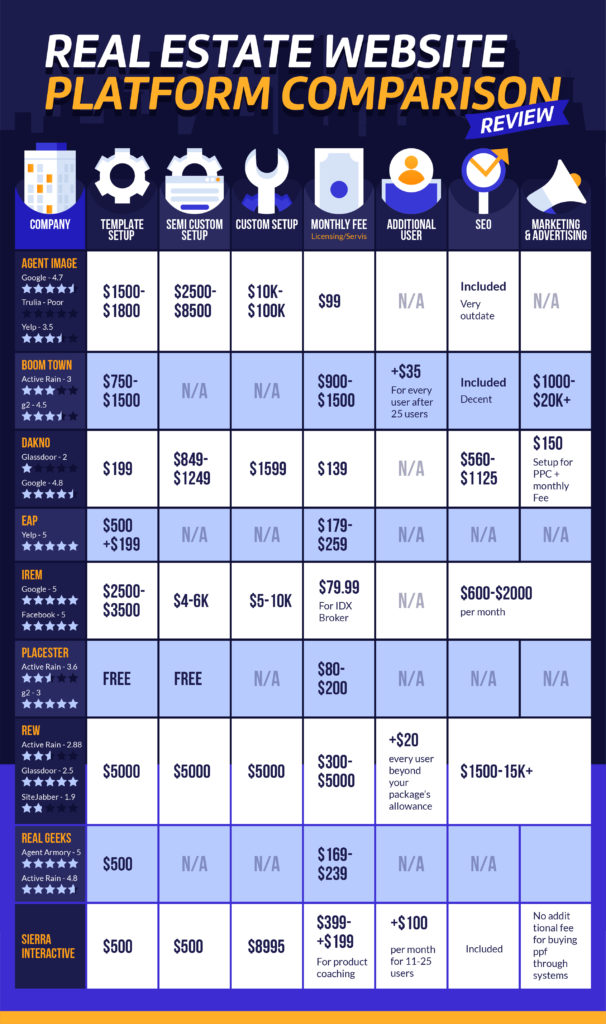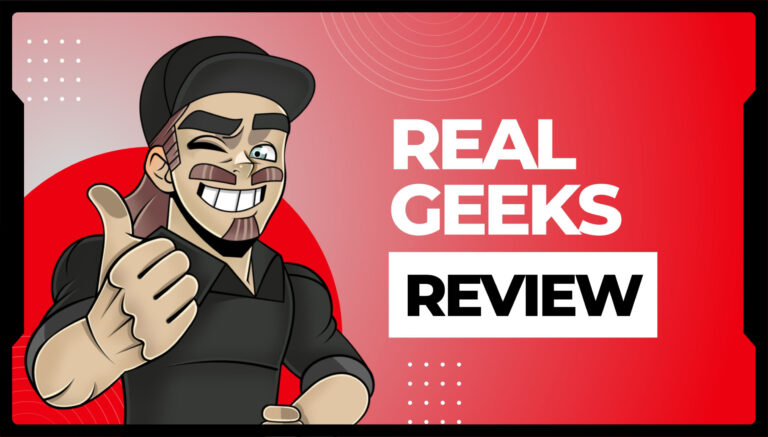Today, we’re tackling a question that’s been on the minds of countless real estate agents: Why does real estate marketing so often feel like a complete waste of money?
I’ve heard so many stories of agents spending tens of thousands of dollars, only to end up with little to show for it.
If that sounds familiar, buckle up, buttercup, because we’re about to dive into why this happens and how you can avoid falling into the same trap.
Understanding the Real Estate Marketing Trap
Let’s start by addressing the root of the problem. Many real estate agents think they’re buying one thing but end up with something entirely different.
“A lack of understanding about what you’re actually purchasing, coupled with some serious misrepresentation from those selling these products, is why so much money is wasted in real estate marketing.”
Here’s how it usually goes:
- You think you’re buying a website from companies like CINC, Boomtown, Sierra Interactive, Lofty (formerly Chime), or kvCORE.
- What you’re really buying is a CRM (Customer Relationship Management system) with a public-facing website as an add-on.
- These companies aren’t in the business of building you a beautiful, high-performance website; they’re selling you a system, and that’s a crucial distinction.
This misunderstanding can cost you big time. CRMs aren’t supposed to be expensive, but when you’re a realtor, the price suddenly skyrockets. Why? Because many agents don’t fully understand what these tools are supposed to do.
The Reality of Systems and CRMs in Real Estate
Now that we’ve identified the root cause of wasted marketing dollars, let’s dive into the specifics of what you’re actually getting when you sign up for these so-called “all-in-one” systems.
What Are You Really Paying For?
Here’s a breakdown of the monthly costs:
- CINC: Around $1,000 a month (maybe $800 with a special offer).
- Boomtown: Similar range, especially for larger teams.
- Sierra Interactive: Approximately $500 a month.
- Lofty (formerly Chime): Around $500 a month.
- kvCORE: Also around $500 a month.
For context, a top-tier CRM like HubSpot costs me $50 a month, and it’s 10 times more robust. Why the massive price difference?
It’s simple—real estate agents don’t always understand what they’re buying, and that misunderstanding is leveraged to justify higher prices.
Free eBooks for Agents

Download any or all of our real estate marketing eBooks. These books contain cutting edge information, deep-diving case studies, actionable hacks to skyrocket your business.
Misaligned Expectations
Let’s be clear: You might think you’re purchasing a cutting-edge website, but what you’re really paying for is a CRM system that comes with a basic public-facing website.
These companies aren’t primarily focused on web design; they’re offering a system meant to manage leads and customer relationships.
The website component is secondary and often lacks the sophisticated features you might expect.
For example, Sierra Interactive does a decent job of balancing its CRM with a functional website. However, even they are not primarily web developers; their strength lies in their CRM and the specific market they cater to.
Takeaway: Before you commit to a high-cost CRM with a website, make sure you fully understand what you’re buying and that it aligns with your business goals.
The Issue with All-in-One Systems
Let’s take a closer look at these “all-in-one” systems that promise to solve all your marketing woes with a single package.
On paper, it sounds like a dream—lead generation, website, CRM, all bundled together.
But here’s the catch: when you try to be everything at once, you end up being mediocre at best in each area.
Why “Jack of All Trades” Isn’t Always a Good Thing
When you buy into one of these systems, you’re essentially saying yes to mediocrity across the board.
The CRM might be functional, the website might look okay, and you might even get a few leads, but none of these components are likely to be industry-leading.
Think about it—if a company is focusing on three or four different aspects of your business, can they really be the best at any of them?
The answer is usually no. When you invest in an all-in-one system, you’re spreading your resources thin, and that often results in subpar performance across the board.
- Boomtown: Offers a comprehensive package, but none of its components stand out as the best in the industry.
- kvCORE: Similar story—lots of features, but not necessarily the best in any particular area.
Even companies like Sierra Interactive, which put a lot of effort into both their CRM and website platforms, can’t excel in every area. They’re good, but not great.
Focused vs. Generalized Services
Now, compare this with companies that focus on one or two specific areas. For example, InboundREM is highly specialized in SEO and content-driven strategies.
We’re not trying to be everything to everyone; we’re focused on being the best at what we do, and that makes a big difference.
“When you’re paying a premium for an all-in-one system, you’re not getting the best CRM, the best website, or the best lead generation tool—you’re getting an average version of each.”
This is where the specialized focus of companies like InboundREM becomes valuable. By zeroing in on what we do best—driving traffic through SEO and high-quality content—we ensure that our clients get the most out of their investment.
Check out our services and pricing to learn how we can help you build a sustainable, lead-generating online presence.
Schedule a Meeting
Let’s chat about how an SEO-focused website that YOU OWN, Google Business Profile Campaigns, or Custom Email Campaigns can generate high-quality leads and exceptional long-term ROI. If my services aren’t the best move for you, I’ll gladly point you in the right direction
The Importance of Specialized Focus
In the world of real estate marketing, focus is everything. This is where the real distinction between success and mediocrity lies.
If you want to get the most out of your marketing dollars, you need to understand the difference between companies that focus on branding versus those that specialize in lead generation.
Branding vs. Lead Generation
- Branding Companies: Luxury Presence, Agent Fire, and Agent Image focus on making you look good. They’re great if your goal is to create a visually appealing website that elevates your brand.
- Lead Generation Companies: Ylopo, Zillow, and Realtor.com are all about lead generation. They’ve built their entire business model around attracting and converting leads.
Branding sites are not designed to generate leads. If your primary goal is lead generation, a branding-focused site isn’t going to get you there. You need a website and a system that are built with lead generation in mind.
Why Focus Matters
When a company specializes in one area, they can devote more resources to excelling in that domain.
This is why companies like Ylopo are known for their lead generation prowess. They’re not trying to be everything to everyone—they’re focusing on what they do best.
“The key to successful real estate marketing is aligning your business goals with the strengths of your marketing tools.”
At InboundREM, our focus is on SEO and content. We understand that 80 to 90% of our efforts need to be dedicated to these areas to yield the best results for our clients.
We’re not just another all-in-one system; we’re a specialized service designed to drive long-term success through targeted strategies.
That’s why we have some jaw-dropping long-term ROIs.
Here’s a helpful infographic on what you might call different specialities, or at least different sub-divisions of real estate marketing services and lead generation companies.

The Reality of Lead Generation
Let’s get real about lead generation. If you’ve been in the real estate game for a while, you know that generating quality leads isn’t as simple as flipping a switch. The days of easy, fast conversions are mostly over.
The “Chase-and-Wait” Model
Many lead generation systems today are built on a “chase-and-wait” model:
- You pay for traffic—often through paid advertising.
- You wait—sometimes for a year or two before those leads convert into clients.
- Follow-up is crucial—emails, text messages, phone calls, and more.
This model isn’t just about paying for leads; it’s about the ongoing effort required to convert those leads into actual clients.
Platforms like Zillow and Realtor.com have shifted to taking a percentage of your commission, often 25% to 45%, for leads that might close in three months, but more likely in a year or two.
For example, Ylopo is one of the few companies that understands this chase-and-wait game. They offer tools that help automate some of the follow-up process, but at a cost.
By the time you’re fully engaged with everything Ylopo offers, you could be spending $2,000 to $4,000 a month.
Challenges of Lead Generation
Lead generation today requires more than just a budget; it requires patience, persistence, and a solid follow-up strategy. Here’s what you need to keep in mind:
- Long Conversion Times: Leads today often take a year or more to convert.
- High Competition: With more agents using the same platforms, the competition for leads is fierce.
- Costly Over Time: Paying a percentage of your commission or a high monthly fee adds up, especially if the leads take a long time to convert.
To see how this plays out in the real world, you might want to take a look at some success stories.
For instance, 5 InboundREM SEO Success Stories and the Bret Wallace GBP Case Study showcase how a well-executed lead generation strategy, particularly one focused on SEO and Google Business Profile optimization, can yield substantial returns.
How This InboundREM Client Makes a 10X ROI
Choosing the Right Marketing Approach
At this point, you might be wondering how to choose the right marketing approach for your business. The truth is, there’s no one-size-fits-all answer.
Self-Assessment: What Kind of Agent Are You?
Your marketing approach should align with your strengths and your goals. Here’s a quick self-assessment:
- Hands-On Agent: If you’re willing to dive deep into the technical aspects, focus on content marketing and SEO. These strategies require time and effort but can yield long-term results.
- Sales-Focused Agent: If you’d rather focus on selling, consider outsourcing your lead generation to services like Zillow Flex or OpCity, even though they take a cut of your commission. This allows you to focus on what you do best while still generating leads.
DIY Alternatives:
- Start with affordable tools like HubSpot and upgrade as your business grows.
- Focus on creating valuable content that resonates with your audience.
If you’re looking for a more hands-on approach to your marketing, InboundREM offers SEO-focused real estate websites with three tiers of monthly content marketing and blogging campaigns, as well as Google Business Profile campaigns to capture hyperlocal SEO leads.
Aligning Marketing with Business Goals
Whatever path you choose, ensure your marketing efforts are aligned with your overall business goals. If you’re unsure where to start, check out InboundREM Return on Investment for insights into what kind of ROI you can expect from various marketing efforts.
Best Real Estate Lead Gen Companies (Long-Term ROI)
Avoiding Common Pitfalls in Real Estate Marketing
Let’s talk about some common pitfalls that can trip up even the most seasoned real estate professionals. The marketing landscape is full of potential landmines, and knowing where they are can save you a lot of time, money, and frustration.
Common Pitfalls to Avoid:
Falling for the Branding Site Trap: Remember, branding sites are not lead generation tools. They look great and can impress clients, but don’t expect them to flood your inbox with leads.
Failing to Do Your Homework: Before you sign up for any service, make sure you’ve done thorough research. Look beyond the sales pitch and dig into what the product actually does—and what it doesn’t do. For detailed insights, check out these reviews:
Underestimating Visual Aids: Use infographics, charts, and graphs to convey complex information quickly and clearly. They’re not just for show—well-crafted visuals can help you and your clients understand key metrics, compare options, and make informed decisions.
“In real estate marketing, patience and persistence are key. Marketing is often a long-term game, and the right approach will pay off over time.”
Here’s an example of a visual aid we think you’ll find very helpful. The pricing may be a little outdated.

The Ethical Consideration in Real Estate Marketing
Ethics in real estate marketing is a topic that’s often overlooked but incredibly important. When choosing a marketing partner, the ethics and transparency of that company should be a top priority.
Evaluating Ethical Practices
- Ylopo: Known for its ethical practices, transparency, and commitment to honest sales processes.
- Agent Image: Leadership is ethical, but there’s sometimes a disconnect between values and sales tactics.
- Real Estate Webmasters: REW has been the center of multiple lawsuits.
“As a real estate professional, it’s crucial to approach these relationships with a healthy dose of skepticism.”
Always do your homework, ask tough questions, and be prepared to walk away if something doesn’t feel right. Your reputation and your business are on the line, and partnering with a company that doesn’t share your ethical standards can do more harm than good.
Effectiveness of Communication Tools
Let’s talk about one of the most overlooked aspects of real estate marketing: the effectiveness of your communication tools.
Key Communication Tools:
- Text Messaging: Essential for quick follow-ups, but not all CRMs handle it well.
- Email Campaigns: Platforms like MailChimp offer more robust features than many CRMs.
Communication is key in any follow-up strategy, and most real estate CRMs offer basic communication features.
However, if you’re serious about closing deals, you might need to look outside these systems for more specialized tools.
For instance, many agents turn to MailChimp for their email campaigns because it offers more robust features than what’s built into their CRM.
The same goes for text messaging—there are specialized tools that can offer better integration and higher engagement rates than the generic solutions provided by many real estate platforms.
Pro Tip: Ensure that your CRM or lead generation tool meets your communication needs. If it doesn’t, consider investing in additional tools that can enhance your strategy.
Real Estate Marketing Services
Real estate marketing doesn’t have to be a waste of money, but it can be if you don’t approach it with a clear understanding of what you’re buying and how it fits into your overall strategy.
Key Takeaways:
- Understand What You’re Buying: Align your investments with your business goals.
- Avoid Common Pitfalls: Be wary of branding sites for lead generation, and always do your homework.
- Choose Ethical Partners: Your marketing partners should share your values and standards.
- Effective Communication is Key: Make sure your communication tools are up to the task.
If you’re ready to dive deeper, explore the resources linked throughout this article. From Best Real Estate Lead Generation Ideas to Bret Wallace GBP Case Study, these tools can help you make smarter choices and avoid the common mistakes that lead to wasted marketing spend.
Interested in SEO-focused real estate websites? Check out InboundREM’s services, offering three tiers of monthly content marketing/blogging campaigns and Google Business Profile campaigns.
Keep in mind that our services are best suited for agents with 2+ years of experience, as SEO content marketing takes time to build momentum, but once it does, it becomes a lead-generating powerhouse.
Thank you for joining me on this deep dive into real estate marketing. If you found this article helpful, please leave a comment, subscribe to my blog, or share your thoughts.
Your feedback helps me create more content that’s tailored to your needs and helps you succeed. Until next time, keep learning, keep growing, and most importantly, keep closing those deals!






